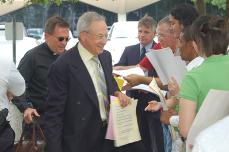The Board of Trustees unanimously approved the strategic Pathways plan with only minor changes Friday afternoon.
The plan still calls for the elimination of 13 majors in addition to the suspension of 13 others, although Human and Organizational Development will now be suspended rather than eliminated. The revisions made deal primarily with name changes and program movements among colleges.
Chemistry and physics will remain separate majors, and physics is still suspended.
The board met for about four hours, both in open and closed sections.
A group of more than 100 students and faculty members, many of whom were dressed in academic robes, gathered in front of Greenville Hall in protest before the meeting, chanting and holding signs as some board members were escorted by Physical Plant and University Police staff members through a back door.
Student Government Association President Daniel Green and Vice President Bob Payne were both present for the open session but were unavailable for comment in time for deadline. As they entered Greenville Hall, students and professors chanted, “S-G-A! S-G-A!”. SGA had passed a resolution denouncing the plan when it was first announced.
“The board approved it, it’s done,” said University President the Rev. Kevin Wildes, S.J. “Now it’s time for implementation.”
Wildes added that changes would be gradual, and he hopes that suspended programs will take the opportunity to prove their viability.
He said that while anger directed at him “makes life difficult,” he has not taken criticism personally and has put his “responsibility to the institution” at the forefront.
He laid out several specific goals, such as more classes for freshmen and sophomores taught by tenured faculty and improvement of Loyola’s residential life.
When asked how he will win back the hearts and minds of the Loyola community, Wildes said his years as an academic have led him to follow his convictions and serve as a decisive leader.
“Part of leadership is doing the kinds of things I’m doing now,” said Wildes. “I think it would have been a failure of leadership on my part to not develop some sort of plan … and now we need to move forward.”
A DIFFERENT PROCESS
But those students and faculty members gathered on the Broadway Campus did not seem to support that leadership.
William Cotton, an associate professor of English, said the plan was enacted too quickly without enough student and faculty input.
“It’s damaging for the university to make these changes in this way, and they’d be better off doing something else,” he said. “I think what’s most troublesome is that we really don’t know the details on which it’s been planned.”
Cotton added that several years ago, the university cut dental hygiene and technology programs, which he said was “painful to those involved”, but nonetheless were made over several years, with a lot data available to faculty. He said this process was very different.
While the cutting of programs such as education and computer science has been widely criticized, there is some hope that the new School of Mass Communication will have a positive effect for its students and will make up for the loss of sequences of study in film studies, communication studies, broadcast journalism and broadcast production.
“Our school may … be more attractive than a department to excellent young candidates for faculty positions, and bright young faculty members who understand the new media world are the future,” Larry Lorenz, a professor of communications, wrote in a message on the Press Club of New Orleans’ Web site.
“A school, as you may know, is semi-autonomous and a more prestigious unit than a department. It is headed by a director, who has more clout than a chair(person), inside and outside the university,” Lorenz said. “That should allow us to command more resources within the university and be in better position to secure outside funding. And as the only school within the new college (of Social Sciences), we are going to be the 800-pound gorilla.”
“If we ensure, as we will certainly do, that our students are broadly educated and understand and can put into practice the basic principles of the work of journalism – especially writing – they will be prepared to handle internships with as many, perhaps more, media outlets as now, and in all areas -newspapers, magazines, news Web sites, and, yes, even radio and television news departments.
“The end result will be graduates who are even better fit for the world and for the newsroom than their predecessors,” Lorenz wrote.
‘REALLY A SHAME’
Overall, sadness seemed to be the dominant emotion among faculty gathered for the protest. Many said that they’ve had little hope for revision of the plan since the initial proposal.
“I think that many of the faculty members expected that (the plan would pass). We didn’t get any signals to make us think otherwise,” said Lynn Koplitz, a chemistry professor and one of the organizers of the day’s protest. “We’ll just have to keep talking to each other and deciding what we have to do at this point,” she said.
“It’s really a shame. I think it will go down in Loyola history as a decision that will leave us in a much worse place. That’s what happens when you have inexperienced leadership that’s not familiar with the institution.”
Kelly Brown can be reached at [email protected].









